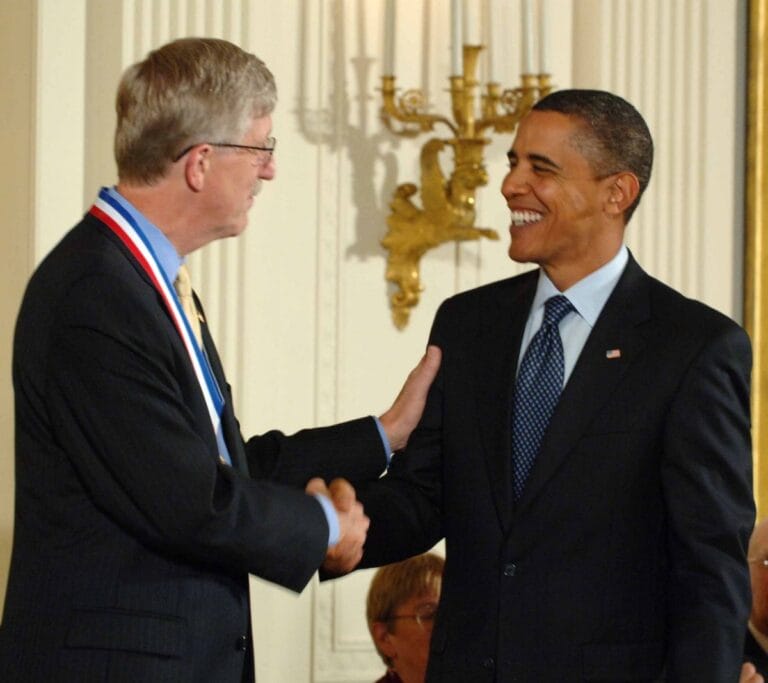Giants in genomics: Francis Collins

Francis Collins led the Human Genome Project from 1993. He was also responsible for discovering the genes mutated in cystic fibrosis and Huntington’s disease.
Key terms
Gene
A section of DNA within a genome that carries a specific set of information - often the information needed to make a protein.
Genome
The complete set of genetic instructions required to build and maintain an organism.
Early life
Born in 1950, Francis Collins grew up on a farm in Virginia, US. He was homeschooled by his mother until the age of 10, before studying chemistry at the University of Virginia and going on to do a PhD in physical chemistry at Yale. Here, he first came across DNA – and almost overnight decided to switch to biomedical science.
A new focus on medical genetics
Francis switched focus and trained as a doctor at the University of North Carolina where he became aware of the problem of inherited conditions and the tremendous challenge they pose for science. In 1981, he returned to Yale as a research fellow in human medical genetics.
At that time, finding genes meant slowly ‘walking’ from one piece of DNA to the next in the hope of stumbling on the gene of interest. Francis developed a more rapid method that made it possible to ‘jump’ along longer stretches of DNA.
Next, he moved to the University of Michigan, where he and his collaborators pinpointed the gene that is mutated in cystic fibrosis. He soon went on to contribute to the discovery of other disease-causing mutations, including the insertion mutation involved in Huntington’s disease.

Francis pioneered a new method for genetics research that made it possible to ‘jump’ between genes of interest, rather than slowly ‘walk’ along a piece of DNA.
Taking the lead of the Human Genome Project
The Human Genome Project had launched in 1990, with James Watson at its head until 1992. Francis accepted an invitation in 1993 to take over the lead. Unwilling to give up lab work entirely, he established an intramural programme of genome research at the National Human Genome Research Institute, US. However, from 1994 much of his time and energy was spent marshalling the international team of competitive, ambitious and highly individual scientists who had, together, taken on the job of reading and assembling the three billion bases of human DNA.

“The Human Genome Project was more significant than going to the Moon.”
Francis Collins, lead of the Human Genome Project from 1993
Overcoming scientific and political challenges
Francis’ diplomatic skills were further challenged in 1998, when Craig Venter launched Celera Genomics with the aim of undertaking the job as a private enterprise. The ‘race’ between the two projects threw Francis into the media spotlight, where he seized the opportunity to champion the importance of making sure all the information from the project was made openly accessible to the public.
“The project,” he told CNN, was “more significant than going to the Moon.” The team ultimately completed the human genome sequence to the best of their technological abilities in 2003, ahead of schedule and under budget.

Francis served as the director of the US National Institutes of Health from 2009 to 2021 – NIH’s longest serving director, spanning 12 years and three presidencies. Here, he oversaw the US government’s investment into biomedical research, from discovery science through to clinical research.
Francis’s research interest is now focused on the genes that contribute to adult-onset diabetes – a huge and growing health problem for both developed and developing countries. His work as a teacher, a researcher and an administrator has won him numerous national and international awards and honours.